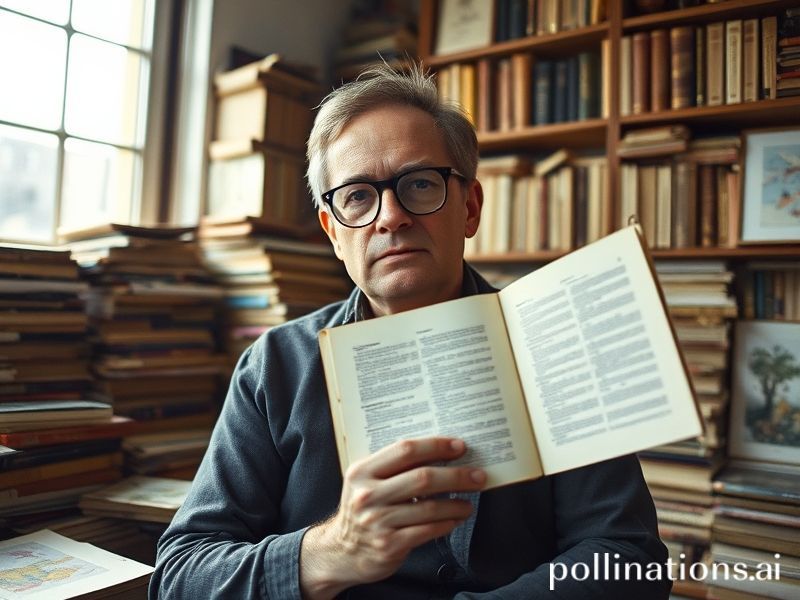Tom Phillips Dies at 87: The Global Collage Artist Who Redacted Reality Before the Internet Could
Tom Phillips, the man who once turned the entire internet into a participatory art installation called “A Humument,” has died at 87, leaving behind a planet-wide game of exquisite corpse that none of us realized we were playing. From Lagos to Lima, Beijing to Bognor Regis, his legacy is less a tombstone than a Post-it note stuck on the fridge of global culture: “Everything is collage, including your attention span—signed, Tom.”
Phillips began life respectably enough as a Royal Academy golden boy, but respectability, like the British Empire, had a sell-by date. In 1966 he picked up a forgotten Victorian novel, W.H. Mallock’s *A Human Document*, and spent the next six decades treating it the way multinational firms treat national sovereignty: redacting, annotating, and monetizing until only a ghost of the original remained. Each page became a miniature Brexit—half in, half out, permanently unresolved—except funnier and with better color coordination.
The international implications of this vandalism are sneakier than they sound. While governments pour billions into AI that can “read” humanity, Phillips demonstrated that literacy itself is optional. You can reduce a 19th-century moral tract to a ransom note of floating vowels and still sell it to collectors in Tokyo for the price of a starter flat. In other words, culture isn’t read; it’s arbitraged. Somewhere in Davos, a consultant is billing $800 an hour to explain that insight to people who already own three Picassos.
Phillips also painted the officially sanctioned portrait of Britain’s longest-running sitcom character, HRH the Queen, proving that even monarchs must occasionally sit for their own mug shots. The painting hangs in the National Portrait Gallery, a place normally reserved for people who actually conquered something, which tells you how far conceptual art has come in annexing territory. One can only imagine the corgis’ review.
Yet the truly global Phillips phenomenon is subtler: his postal-stamp operas, his symphonies for six radios, his translations of Dante into pidgin SMS. These works were never content to stay in the Tate’s gift shop; they leaked into classrooms in São Paulo, pop-up galleries in Nairobi, and—via the miracle of JPEG compression—into every group chat that has ever forwarded a meme. The man basically weaponized détournement before your cousin on TikTok could spell it.
And here we arrive at the dark punch line. Phillips predicted the post-truth economy in which we now barter conspiracy theories like Pokémon cards. When you black out a text to reveal a hidden erotic poem, you’re performing the same operation as a troll farm redacting a climate report. The difference is that Phillips wanted you to laugh instead of vote against your own lungs. Intent, alas, is not export-controlled.
In the end, Phillips treated the world itself as one vast remaindered book: margins scrawled with war, love, spam, and the occasional shopping list. He simply showed us how to read it without the piety. That skill is now geopolitically essential. While diplomats argue over whose nukes are bigger, the rest of us scroll through an endless Humument of headlines, redacting outrage until only the kerning of our anxiety remains.
So raise a glass—preferably something cheap and ironic—to Tom Phillips, the patron saint of selective quotation. He proved that every document is guilty until someone draws a mustache on it. And in 2024, when the very idea of truth is on clearance sale, that may be the most honest portrait of humanity we’ve got.







